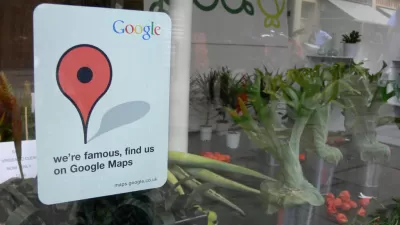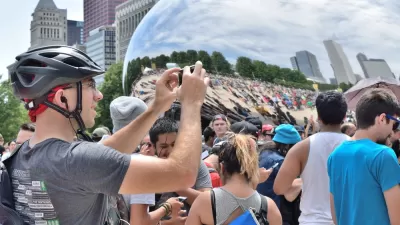All historic maps are welcome in Google's open source machine learning project.

A retrospective mapping project called “rǝ,” led by Google's Raimondas Kiveris, uses historical fire insurance maps as the primary information source for a machine learning venture that aims to map cities as they existed in the past.
"With a slider to control the year, the map displays a historically accurate representation of development in almost any U.S. city dating back to 1800. Automatically generated 3D models of buildings rise from the landscape as the slider moves forward through time," writes Nate Berg.
The open-source map also includes a low-res Google Street View rendering that shows users roughly what a city may have looked like in a given year in the past.
Amateur cartographers and other map enthusiasts can contribute their own historical maps to the open source project. "It can even integrate photographs of buildings, using deep learning to analyze images and augment the blocky 3D models with architectural details," notes Berg.
Kiveris's team anticipates that the map will eventually contain enough visual data to render accurate, lifelike representations of neighborhoods. Kiveris says the renderings could even be used in video games or movies within five years.
That level of detail will require a lot more information, from a wider pool of contributors. “Where we think we really could get good coverage is, for instance, you going to your parents or grandparents and digging through shoeboxes and finding photos,” he says. With good photographs along with known dates and locations, the model can create 3D versions of buildings in a matter of days.
Kiveris is hoping the map will eventually be able to model even more detail, such as the interiors of spaces. “What was inside the building in the 1920s, what did the kitchen look like in the 1940s,” he says. “It becomes a compendium of everyday, mundane life.”
According to Kiveris, the project will preserve the history of buildings regardless of their historical status or widespread cultural significance.
FULL STORY: This incredible Google experiment lets you time travel to your hometown 200 years ago

Maui's Vacation Rental Debate Turns Ugly
Verbal attacks, misinformation campaigns and fistfights plague a high-stakes debate to convert thousands of vacation rentals into long-term housing.

Planetizen Federal Action Tracker
A weekly monitor of how Trump’s orders and actions are impacting planners and planning in America.

San Francisco Suspends Traffic Calming Amidst Record Deaths
Citing “a challenging fiscal landscape,” the city will cease the program on the heels of 42 traffic deaths, including 24 pedestrians.

Defunct Pittsburgh Power Plant to Become Residential Tower
A decommissioned steam heat plant will be redeveloped into almost 100 affordable housing units.

Trump Prompts Restructuring of Transportation Research Board in “Unprecedented Overreach”
The TRB has eliminated more than half of its committees including those focused on climate, equity, and cities.

Amtrak Rolls Out New Orleans to Alabama “Mardi Gras” Train
The new service will operate morning and evening departures between Mobile and New Orleans.
Urban Design for Planners 1: Software Tools
This six-course series explores essential urban design concepts using open source software and equips planners with the tools they need to participate fully in the urban design process.
Planning for Universal Design
Learn the tools for implementing Universal Design in planning regulations.
Heyer Gruel & Associates PA
JM Goldson LLC
Custer County Colorado
City of Camden Redevelopment Agency
City of Astoria
Transportation Research & Education Center (TREC) at Portland State University
Jefferson Parish Government
Camden Redevelopment Agency
City of Claremont




























